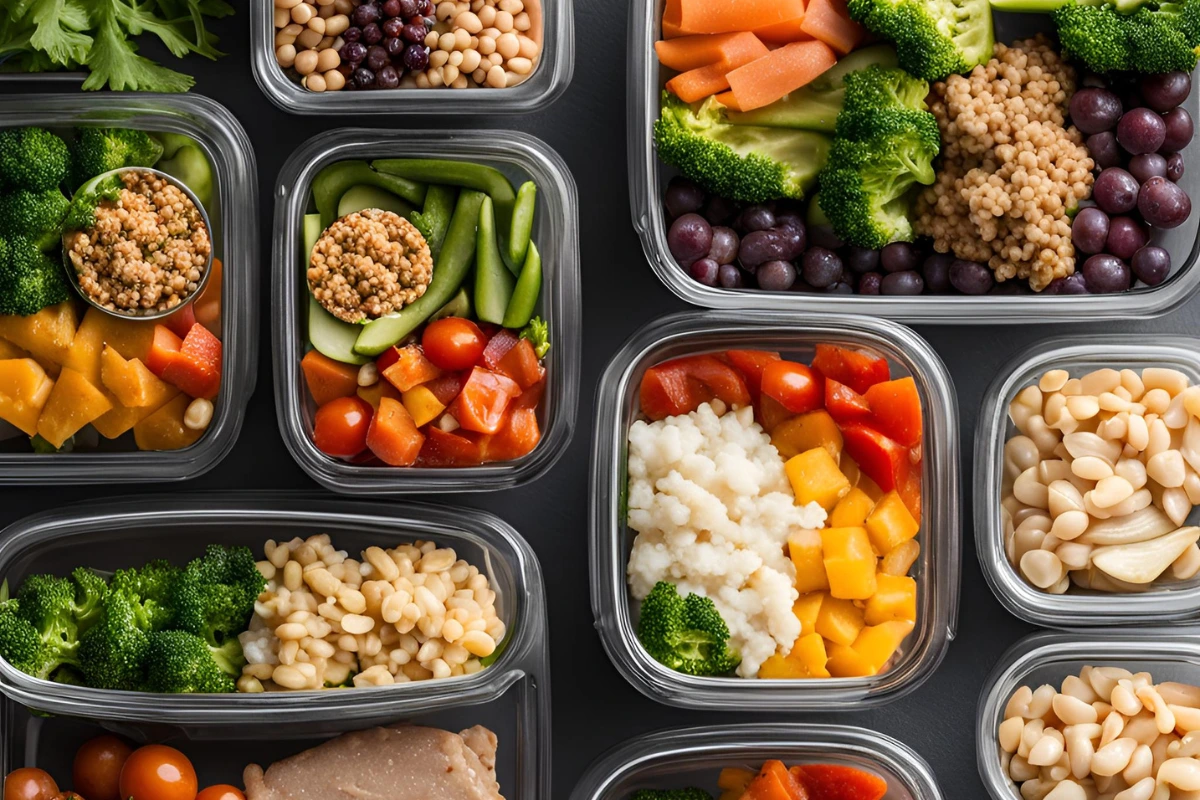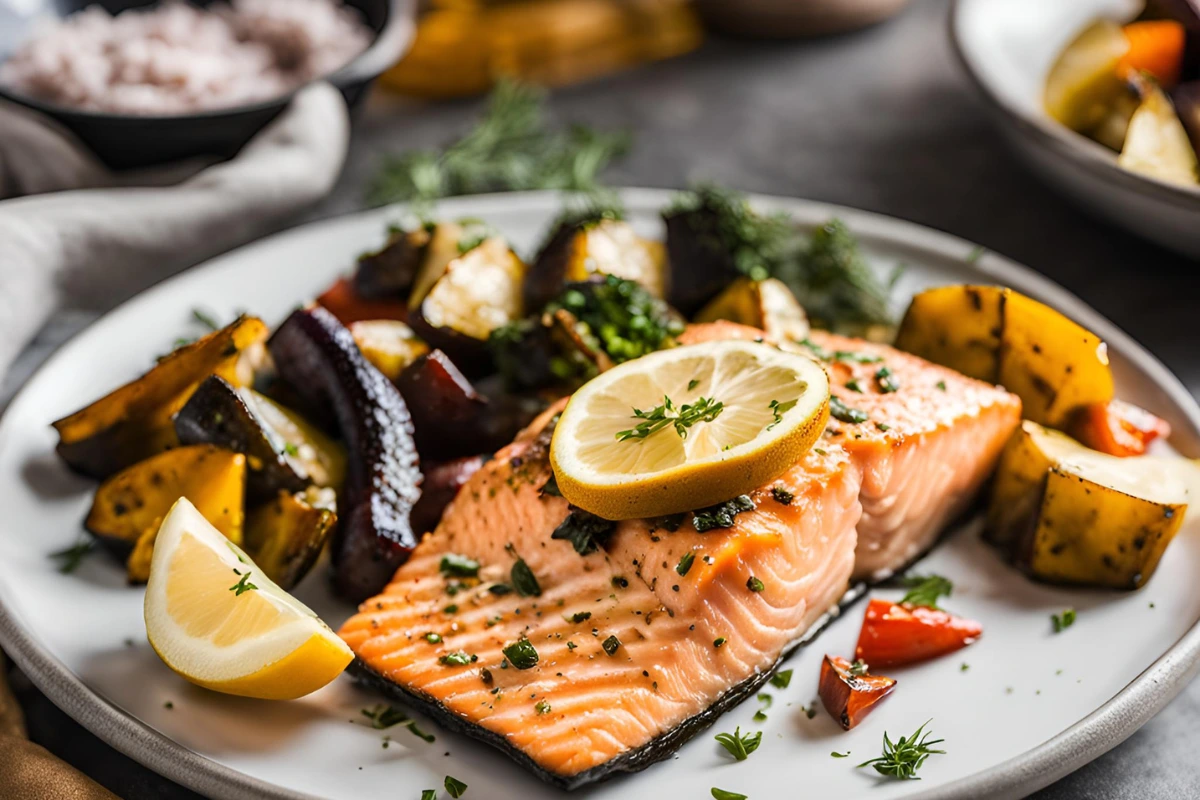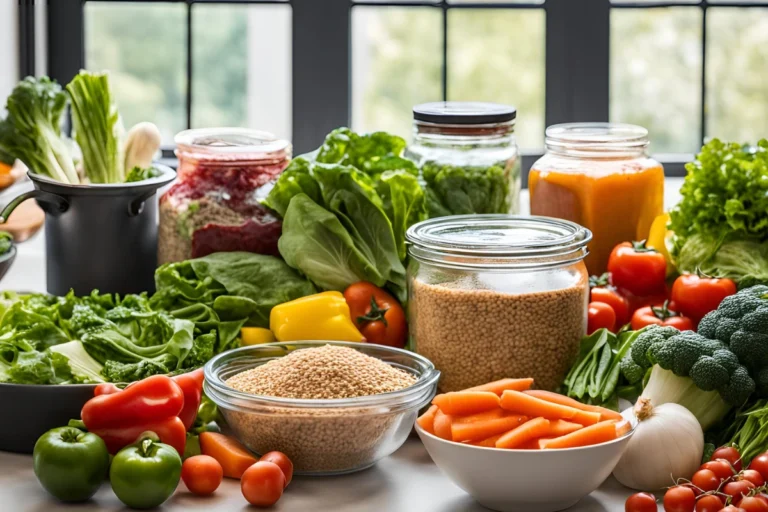As we age, maintaining a healthy diet becomes increasingly important for our overall health and longevity. Preparing nutritious meals at home is one of the best ways to ensure we’re getting the right balance of nutrients to support healthy aging. In this comprehensive guide, we’ll explore the principles of healthy aging nutrition and provide delicious, easy-to-prepare dinner recipes that can help promote wellness and longevity.
Table of Contents
The Importance of Nutrition for Healthy Aging
A well-balanced diet rich in essential nutrients is crucial for supporting our bodies as we age. Key nutrients that become especially important include:
- Protein: Helps maintain muscle mass and strength
- Fiber: Supports digestive health and helps control cholesterol levels
- Omega-3 fatty acids: Beneficial for brain and heart health
- Calcium and vitamin D: Essential for bone health
- Antioxidants: Help fight inflammation and oxidative stress
By incorporating foods rich in these nutrients into our daily meals, we can give our bodies the fuel they need to age gracefully and maintain optimal health.
Meal Prep Tips for Healthy Aging Dinner

Meal prepping can be an excellent strategy for ensuring you always have nutritious options on hand. Here are some tips to make healthy Aging Dinner meal prep easier:
- Plan your meals: Take some time each week to plan out your dinners
- Batch cook: Prepare larger portions to have leftovers for lunches or future dinners
- Use versatile ingredients: Choose foods that can be used in multiple recipes
- Prep ingredients ahead: Wash and chop vegetables in advance
- Invest in quality storage containers: Use glass or BPA-free plastic containers for storing prepped meals
With these strategies in place, you’ll be well-equipped to maintain a healthy diet throughout the week.
Nutritious Dinner Recipes for Longevity

Now let’s dive into some delicious and nutritious dinner recipes that are perfect for supporting healthy aging. These recipes are packed with longevity-promoting ingredients and are easy to prepare.
1. Mediterranean Baked Salmon with Vegetables
This colorful, one-pan meal is rich in omega-3 fatty acids and antioxidants.
Ingredients:
- 4 salmon fillets
- 2 cups cherry tomatoes
- 1 zucchini, sliced
- 1 yellow bell pepper, chopped
- 1/4 cup kalamata olives
- 2 tbsp olive oil
- 2 cloves garlic, minced
- 1 tsp dried oregano
- Salt and pepper to taste
- Lemon wedges for serving
Instructions:
- Preheat oven to 400°F (200°C).
- In a large baking dish, toss vegetables with olive oil, garlic, oregano, salt, and pepper.
- Place salmon fillets on top of the vegetables.
- Bake for 20-25 minutes, until salmon is cooked through and vegetables are tender.
- Serve with lemon wedges.
2. Lentil and Spinach Curry
This protein-packed vegetarian curry is full of fiber and anti-inflammatory spices.
Ingredients:
- 1 cup dried lentils
- 1 tbsp coconut oil
- 1 onion, diced
- 2 cloves garlic, minced
- 1 tbsp grated ginger
- 2 tsp curry powder
- 1 can diced tomatoes
- 4 cups spinach
- 1 can of coconut milk
- Salt to taste
- Fresh cilantro for garnish
Instructions:
- Cook lentils according to package instructions.
- In a large pot, heat coconut oil and sauté onion, garlic, and ginger until fragrant.
- Add curry powder and cook for another minute.
- Add tomatoes, cooked lentils, and coconut milk. Simmer for 10 minutes.
- Stir in spinach and cook until wilted.
- Season with salt and garnish with cilantro before serving.
3. Quinoa-Stuffed Bell Peppers
These colorful stuffed peppers are packed with protein, fiber, and vitamins.
Ingredients:
- 4 bell peppers, halved and seeds removed
- 1 cup quinoa
- 1 can black beans, drained and rinsed
- 1 cup corn kernels
- 1 cup diced tomatoes
- 1/2 cup chopped cilantro
- 2 tsp cumin
- 1 tsp chili powder
- Salt and pepper to taste
- 1/2 cup shredded cheese (optional)
Instructions:
- Preheat oven to 375°F (190°C).
- Cook quinoa according to package instructions.
- Preheat oven to 375°F (190°C).
- In a large bowl, mix cooked quinoa with black beans, corn, tomatoes, cilantro, cumin, chili powder, salt, and pepper.
- Stuff the bell pepper halves with the quinoa mixture.
- Place stuffed peppers in a baking dish and cover with foil.
- Bake for 30-35 minutes, then uncover and sprinkle with cheese if using.
- Bake for an additional 5 minutes until cheese is melted.
4. Grilled Chicken and Vegetable Skewers
These colorful skewers are a great way to incorporate a variety of vegetables into your meal.
Ingredients:
- 1 lb boneless, skinless chicken breast, cut into cubes
- 1 zucchini, sliced
- 1 red onion, cut into chunks
- 1 red bell pepper, cut into chunks
- 1 yellow bell pepper, cut into chunks
- 8 oz mushrooms
- 2 tbsp olive oil
- 2 tbsp lemon juice
- 2 cloves garlic, minced
- 1 tsp dried oregano
- Salt and pepper to taste
Instructions:
- In a bowl, whisk together olive oil, lemon juice, garlic, oregano, salt, and pepper.
- Thread chicken and vegetables onto skewers, alternating ingredients.
- Brush the skewers with the marinade.
- Grill for 10-12 minutes, turning occasionally, until chicken is cooked through and vegetables are tender.
5. Herb-Roasted Turkey Breast with Sweet Potatoes
This hearty meal is rich in lean protein and beta-carotene.
Ingredients:
- 2 lb turkey breast
- 2 sweet potatoes, cut into chunks
- 2 tbsp olive oil
- 2 tsp dried thyme
- 2 tsp dried rosemary
- 2 cloves garlic, minced
- Salt and pepper to taste
Instructions:
- Preheat oven to 375°F (190°C).
- In a small bowl, mix olive oil, thyme, rosemary, garlic, salt, and pepper.
- Rub the herb mixture all over the turkey breast.
- Place turkey in a roasting pan and surround with sweet potato chunks.
- Roast for 1 hour or until turkey is cooked through and sweet potatoes are tender.
Incorporating Longevity-Promoting Foods
When planning your meals, try to incorporate these foods known for their longevity-promoting properties:
- Leafy greens: Rich in vitamins, minerals, and antioxidants
- Berries: High in antioxidants and fiber
- Nuts and seeds: Good sources of healthy fats and protein
- Whole grains: Provide fiber and B vitamins
- Legumes: Excellent sources of plant-based protein and fiber
- Fatty fish: Rich in omega-3 fatty acids
- Olive oil: A key component of the heart-healthy Mediterranean diet
- Herbs and spices: Many have anti-inflammatory properties
By regularly including these foods in your meals, you can boost the nutritional value of your diet and support healthy aging.
Don’t forget the importance of variety when planning your healthy aging dinner meals. Eating a wide range of foods ensures you’re getting a broad spectrum of nutrients and helps prevent meal fatigue.
Rotate your proteins between lean meats, legumes, and fatty fish, and experiment with different cuisines to keep things interesting. For example, one night you could enjoy a Mediterranean-inspired baked salmon, and the next, a warming lentil curry. Mixing up your meals not only supports longevity through diverse nutrients but also makes the process of meal prep more exciting and fun.
Meal Prep Strategies for Busy Schedules
For those with busy lifestyles, meal prepping can be a game-changer. Here are some strategies to make healthy eating easier throughout the week:
- Cook in batches: Prepare larger portions of proteins, grains, and vegetables that can be mixed and matched for different meals.
- Use your freezer: Many meals can be prepared in advance and frozen for later use.
- Prep ingredients: Wash and chop vegetables, cook grains, and prepare proteins in advance to make weeknight cooking faster.
- Make use of leftovers: Plan meals that can easily be repurposed into new dishes the next day.
- Keep a well-stocked pantry: Having staples on hand makes it easier to throw together quick, healthy meals.
Incorporating seasonal produce into your meal prep is another excellent way to enhance nutrition while keeping your dinners exciting and budget-friendly. Seasonal fruits and vegetables are often fresher, tastier, and more nutrient-dense than out-of-season options
For example, in the fall, roasted butternut squash or Brussels sprouts make a perfect side dish, while summer’s abundance of zucchini, tomatoes, and leafy greens can inspire fresh salads or light sautés. Shopping at local farmers’ markets or subscribing to a CSA (Community Supported Agriculture) box can help you discover seasonal produce while supporting local growers.
The Importance of Portion Control
While focusing on nutritious ingredients is crucial, it’s also important to pay attention to portion sizes. As we age, our calorie needs often decrease, but our nutrient needs remain high. Here are some tips for maintaining healthy portions:
- Use smaller plates to naturally reduce portion sizes
- Fill half your plate with vegetables
- Limit high-calorie condiments and dressings
- Be mindful of snacking between meals
- Stay hydrated, as thirst can sometimes be mistaken for hunger
By being mindful of both what and how much you eat, you can ensure you’re getting the right balance of nutrients without overeating.
Adapting Recipes for Healthy Aging Dinner
As we age, we may develop specific dietary needs or restrictions. Here are some tips for adapting recipes:
- Low-sodium diets: Reduce salt and use herbs and spices for flavor
- Diabetes-friendly: Focus on low-glycemic ingredients and balanced meals
- Heart-healthy: Choose lean proteins and healthy fats like olive oil
- Gluten-free: Substitute wheat-based ingredients with gluten-free alternatives
- Vegetarian/vegan: Use plant-based proteins like beans, lentils, and tofu
Always consult with a healthcare provider or registered dietitian for personalized dietary advice.
Another key to successful healthy aging meal prep is embracing flavor without relying on salt or heavy sauces. Experimenting with herbs, spices, and natural flavor boosters like citrus zest, garlic, or ginger can elevate your meals while keeping them heart-healthy.
For instance, a squeeze of lemon over grilled fish or a sprinkle of smoked paprika on roasted sweet potatoes can create bold, satisfying flavors without additional sodium. This approach not only supports specific dietary needs, such as low-sodium diets but also keeps your meals vibrant and enjoyable.
The Role of Hydration in Healthy Aging
Staying properly hydrated is crucial for overall health and becomes even more important as we age. Adequate hydration supports:
- Digestion
- Nutrient absorption
- Joint health
- Skin elasticity
- Cognitive function
Aim to drink plenty of water throughout the day. Herbal teas and water-rich foods like cucumbers and watermelon can also contribute to your daily fluid intake.
Conclusion: Fueling Your Healthy Aging Dinner
Eating a nutritious diet is one of the most powerful things we can do to support healthy aging. By focusing on whole, nutrient-dense foods and preparing meals at home, we can ensure we’re giving our bodies the fuel they need to thrive. The recipes and strategies outlined in this guide provide a starting point for creating delicious, health-promoting meals that support longevity and wellness.
Remember, healthy aging is about more than just what we eat. Regular physical activity, stress management, social connections, and regular health check-ups all play important roles in our overall well-being as we age. By combining a nutritious diet with these other healthy lifestyle factors, we can set ourselves up for a vibrant, active future.

